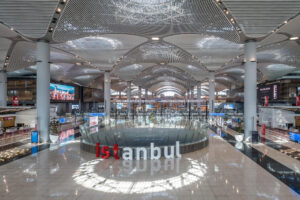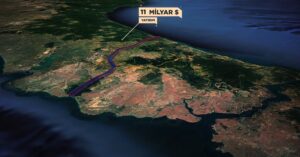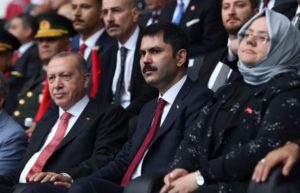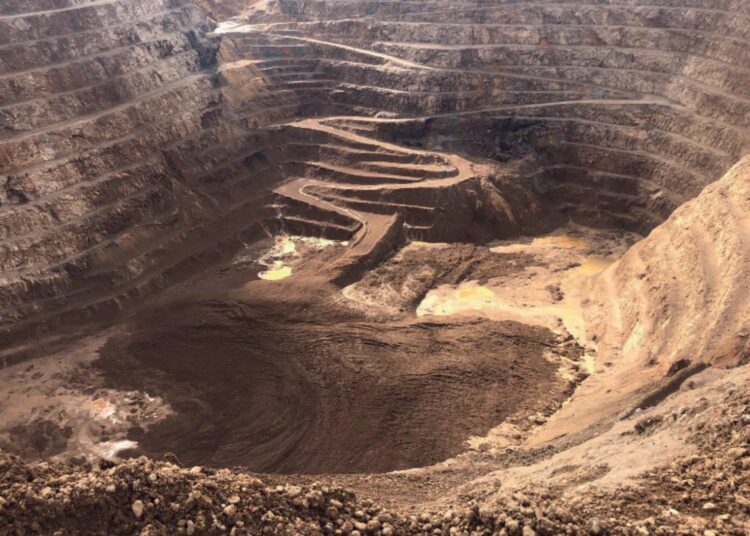Abdullah Bozkurt/Stockholm
A Turkish government document has exposed a sweeping environmental oversight scandal in which critical environmental impact assessments were systematically undermined. This allowed industrial, mining and construction projects to bypass scientific scrutiny and regulatory controls while enriching associates of Turkish President Recep Tayyip Erdogan through highly lucrative deals.
Prepared by Turkey’s Ministry of Environment, Urbanization and Climate Change as part of its 2024 activity report, the document inadvertently reveals major regulatory failures within the Environmental Impact Assessment (Çevresel Etki Değerlendirmesi, ÇED) process, a cornerstone of environmental protection in the country.
According to the document, of the 4,076 projects reviewed in 2024, an astounding 3,436 received “ÇED Not Required” decisions. Only 641 projects were granted positive ÇED evaluations, while 376 were denied approval. In effect, over 84 percent of all reviewed projects proceeded without undergoing a full environmental impact assessment.
Environmental experts and watchdog groups are sounding the alarm, describing the process as a cash cow for Erdogan’s administration that benefits select corporations and individuals at the expense of public health, natural ecosystems and long-term environmental sustainability.
The mining sector has been particularly prone to exemptions or manipulated ÇED reports that fail to adequately consider the true environmental impact. Of the 1,368 mining project applications submitted in 2024, 1,153 were exempted from comprehensive ÇED reviews. Critics warn that aggressive mining, conducted without proper regard for environmental concerns, has already led to serious consequences, including contamination of underground water supplies, destruction of farmland, rampant deforestation, and disruption of the ecological balance. These effects are becoming increasingly visible amid Turkey’s escalating climate crisis.
Excerpts from the government report revealing manipulation of environmental impact assessments (ÇED):
The issue is not limited to 2024 but reflects a broader pattern that has characterized Erdogan’s two-decade-long rule. Between 2002 and 2022, official government data show that out of 81,773 project applications submitted during the 20-year time in power of the ruling Justice and Development Party (AKP), only 24 were rejected based on ÇED reports.
A loophole introduced in 2009 by the Erdogan government further weakened the process. A circular issued by the government allowed the Review and Evaluation Commission (İnceleme Denetleme ve Değerlendirme Komisyonu, İDK) — an internal body of the Ministry of Environment, Urbanization and Climate Change — to approve a project even if its ÇED report had been annulled or was subject to a court injunction. The İDK could simply re-evaluate and greenlight the project after reviewing the report’s shortcomings, effectively sidestepping legal obstacles and nullifying judicial review.
What’s more, positive ÇED reports are increasingly being used as tools to legitimize large-scale infrastructure projects rather than critically evaluating their potential consequences. The lack of transparency and public participation in the preparation of these reports remains a lingering issue in Turkey. Often described as rubber stamps for politically approved projects, such reports are frequently neither conducted by independent institutions nor developed through meaningful public consultation, undermining their credibility and raising serious concerns about their effectiveness.

For instance, two of Istanbul’s most controversial projects — the third airport and Kanal Istanbul — have revealed significant discrepancies between the content of their respective ÇED reports and the final project approvals. The third airport, officially named Istanbul Airport (İstanbul Havalimanı), is one of the largest infrastructure projects in Turkey’s history. The contract, worth approximately $12 billion, was awarded through non-competitive bidding to pro-Erdogan companies such as Cengiz Holding, Limak Holding, Kolin Construction and the Kalyon Group. Although the government’s own ÇED report raised alarms about the environmental impact, it was nevertheless approved.
Kanal Istanbul, a proposed artificial waterway that has faced widespread criticism from environmentalists, scientists and urban planners, also received a positive ÇED report. Valuable land along the Kanal Istanbul route was acquired early on, at low prices and in large quantities by members of Erdogan’s family and close associates. Some of these plots have already been sold to Qatari investors. When the project is realized, they stand to make billions of dollars by developing luxury waterfront residences in the heart of Istanbul.
Critics emphasize that opposition to these projects is not rooted in an anti-development stance but in a demand for responsible, science-based oversight. When the ÇED process is sidelined, they argue, the damage extends far beyond nature and directly affects public health, food security and air quality. Contaminated groundwater reaches homes and crops, forests are razed and toxins from unregulated mines enter the food chain, contributing to rising rates of asthma, cancer and other illnesses.

The ministry’s failings echo longstanding warnings from Turkey’s Court of Accounts (Sayıştay), which as early as 2019 flagged a common tactic among corporations: dividing large-scale projects into smaller segments to evade environmental scrutiny. Despite these warnings, the ministry has continued to authorize such strategies, further eroding public confidence in environmental governance.
While some argue that Turkey must tap into its mineral wealth to support its industrial base, even proponents agree this must be done transparently, based on sound scientific data and with genuine environmental safeguards.
Environmental activists are now calling for a comprehensive overhaul of the ÇED process to restore its legitimacy and effectiveness. Their demands include ending the “ÇED Not Required” loopholes, ensuring transparent public participation in project approvals, implementing Court of Accounts’s recommendations and holding both government officials and private corporations accountable for regulatory abuse.
A stark example of this regulatory negligence came to light following a deadly mine collapse in the İliç district of Erzincan province on February 13, 2024. The incident buried nine workers under a massive landslide in the heap leach area of a gold mine operated by Anagold Madencilik, a joint venture between Canadian-based SSR Mining and Turkish partner Lidya Madencilik.

According to a report submitted by the main opposition party to a special parliamentary inquiry commission, the ÇED approvals for the project were granted despite warnings of serious geotechnical risks as early as 2021. The mine’s heap leach pad, a massive structure used to extract gold using cyanide, was operating far beyond its approved capacity of 58 million tons.
Opposition lawmakers allege that the companies circumvented environmental reviews by fragmenting their projects into smaller proposals to avoid meaningful scrutiny. This continued despite previous incidents — including a cyanide spill in 2022 and earlier landslides — and the mine was allowed to expand operations without the necessary infrastructure to safely support the increased capacity.
The report further warned of long-term environmental devastation due to the uncontrolled spread of toxic substances such as cyanide and heavy metals. These chemicals threaten to contaminate the Karasu River, which flows into the Euphrates River, posing risks to ecosystems and human populations across nine provinces and three countries, potentially reaching as far as the Persian Gulf.
Adding to the danger, the mine is located on the Munzur fault line. Experts warn that this geological feature could trigger earthquakes exceeding magnitude 7, yet this seismic risk was ignored in the project’s approval process, a decision the opposition described as reckless.
Lawmakers also emphasized the severe socio-economic impact on nearby communities. Traditional livelihoods in villages like Sabırlı and Çöpler — farming, beekeeping and animal husbandry — have been devastated by pollution, noise and land seizures linked to mining operations.
The report strongly criticized then-environment minister Murat Kurum for signing the 2021 ÇED approval despite the red flags raised by experts. It also accused the judiciary of shielding senior government officials and corporate executives from accountability, leaving only lower-level employees to bear the legal consequences.












